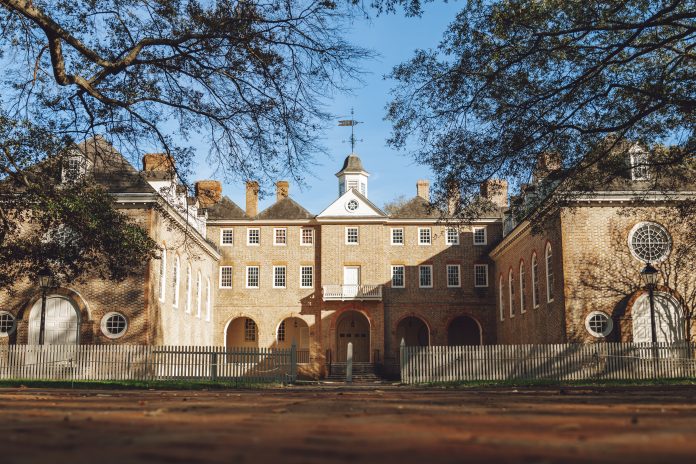The following article was previously published on The Flat Hat’s website during the week of Oct. 9. However, due to an unforeseen technological glitch, it was removed from the website for a period of time and was re-uploaded today, Nov. 6.
Sunday, Oct. 8, members of Indigenous communities throughout the United States gathered in the School of Education’s Matoaka Room for the inaugural Indigenous People’s Feast.
Incoming Director of Innovation and Entrepreneurship in Conservation at the Institute for Integrative Conservation Troy Wiipongwii (Chickahominy) MPP ’18 led the event, highlighting local tribal efforts to revitalize Indigenous food systems in Virginia.
A 2022 Indigenous food sovereignty grant, awarded by the Thomas F. and Kate Miller Jeffress Memorial Trust, made Wiipongwii’s research possible. Zach Conrad and Matthias Leu are also both faculty that are leading the grant with Wiipongwii. Conrad is an Assistant Professor in the Department of Kinesiology and a Faculty Affiliate at the Global Research Institute, and Matthias Leu is an Associate Professor in the Department of Biology. Their work largely focuses on the relationship between Indigenous food systems, technology and politics.
“We’re building decision support tools for tribal communities to make better decisions on what to grow, how much to grow, where to grow it,” Wiipongwii said. “It’s really balancing multiple competing strains of sustainability, cultural use, health needs and economy and optimizing what you grow for food sovereignty.”
By hosting the feast, Wiipongwii emphasized the importance of food as a gathering element for Indigenous peoples.
“I thought that this feast would be a really good showcase of what happens on the consumer end,” Wiipongwii said in an interview.
He worked alongside local Indigenous chefs and leaders to organize the feast, including Lonnie and Ginger Custalow, Jasmine Anderson, Joe Rocchi, Tomalita Peterson, Beth Roach, Ben Walters, Keenan Stewart and Lynette Allston, among others.
Before the event began, guests ate appetizers of bison meat pies and Indigenous fry bread. Chefs also served beverages, including apple cider, a traditional citrus-flavored drink and teas from Indigenous plants.
The event opened with a land acknowledgment and introduction by Allston, chief of the Nottoway Indian Tribe of Virginia, and Dakota Kinsel ’26. Allston emphasized the importance of land acknowledgements, particularly those related to the College of William and Mary.
“Land acknowledgements are really a catalyst for advancement,” Allston said. “William and Mary made a declaration, and over the past two decades, they have adhered to that declaration to help and advance the Virginia tribes.”
Allston mentioned the Brafferton Indian School at the College, which instructed young Indigenous men between 1723 and 1776. Allston referenced the cultural shift in food consumption for Indigenous men attending the school during this period.
“What was it like to eat English food?” Allston said. “This was a culture shock, coming from all the different tribal towns.”
Before attendees started their meal, Walters of the Nottoway Indian Tribe gave the Tuscarora Thanksgiving Address, and the chefs shared information about the traditional Indigenous foods they prepared. Among these dishes were collard greens, brown chicken, Indigenous shrimp and wild rice jollof. The meal was served buffet style.
Several chefs emphasized the connection between family and cooking.
“What I brought with me today are things that were handed down from my grandmother,” Peterson of the Lumbee Tribe said. “I was raised by very, very strong women, and they were very self-sufficient and hard workers.”
Lonnie Custalow highlighted the significance of cooking and family legacy, particularly when he was growing up on the Mattaponi reservation.
“Food sovereignty will be necessary and important in the future for humans to survive,” Custalow said. “Teach your children to hunt, teach them to fish and teach them to plant a garden.”
Rocchi of the Pamunkey Tribe shared his journey researching Indigenous foods.
“Our foods literally changed the face of the planet,” Rocchi said. “The more I started to research, the more I realized I wanted to change the course of my career to help educate people and to help bring our foods back.”
Rocchi mentioned the difficulties of tracing the origins of Indigenous foods.
“Now, it’s time for our people to come together and research, which means bringing those things back to the point where I can actually recreate food from 500 years ago,” Rocchi said. “We learn to take those things — understand what they were, how they were used, how they were significant for our people — and then use 21st-century cutting-edge technology to make them something that people want to eat today.”
Local Indigenous leaders also shared their missions before the feast commenced.
Roach, who is of Nottoway descent, is the co-founder of Alliance of Native Seedkeepers, an organization that strives to make heirloom seeds and food available to the public.
“We are a movement for cultural connection, a beacon of environmental stewardship and a source of empowerment for tribal communities,” Roach said. “Our mission is to breathe life into Indigenous new traditions and strengthen the spiritual bond between people and our seeds.”
With the continued support of local Indigenous leaders and chefs, Wiipongwii plans to make the Indigenous People’s Feast a semiannual event to showcase foods from both fall and spring harvests.
Through hosting these feasts, Wiipongwii hopes to further explore Virginia’s Indigenous food systems while unifying individual community members, regardless of tribal enrollment status.
“Food and culinary experience is very much the user interface of our food systems,” Wiipongwii said. “This is a really good way to showcase the past, present and future of food and see where we can go.”
CORRECTION (11/6/23): Article was updated by Sarah Devendorf, the Standards and Practices Editor to change “Costolo” to Custalow as that is the correct spelling. Additionally, the article was updated to provide credit to Zach Conrad and Matthias Leu for leading the grant with Wiipongwii. The Editor also wrote out both leaders’ full titles.

